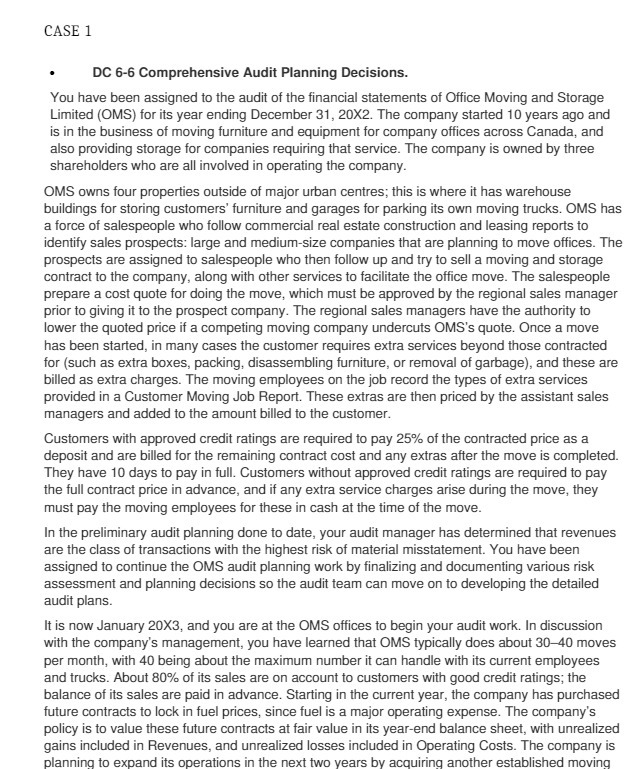CASE 1 DC 6-6 Comprehensive Audit Planning Decisions. You have been assigned to the audit of the financial statements of Office Moving and Storage Limited (OMS) for its year ending December 31, 20X2. The company started 10 years ago and is in the business of moving furniture and equipment for company offices across Canada, and also providing storage for companies requiring that service. The company is owned by three shareholders who are all involved in operating the company. OMS owns four properties outside of major urban centres; this is where it has warehouse buildings for storing customers' furniture and garages for parking its own moving trucks. OMS has a force of salespeople who follow commercial real estate construction and leasing reports to identify sales prospects: large and medium-size companies that are planning to move offices. The prospects are assigned to salespeople who then follow up and try to sell a moving and storage contract to the company, along with other services to facilitate the office move. The salespeople prepare a cost quote for doing the move, which must be approved by the regional sales manager prior to giving it to the prospect company. The regional sales managers have the authority to lower the quoted price if a competing moving company undercuts OMS's quote. Once a move has been started, in many cases the customer requires extra services beyond those contracted for (such as extra boxes, packing, disassembling furniture, or removal of garbage), and these are billed as extra charges. The moving employees on the job record the types of extra services provided in a Customer Moving Job Report. These extras are then priced by the assistant sales managers and added to the amount billed to the customer. Customers with approved credit ratings are required to pay 25% of the contracted price as a deposit and are billed for the remaining contract cost and any extras after the move is completed. They have 10 days to pay in full. Customers without approved credit ratings are required to pay the full contract price in advance, and if any extra service charges arise during the move, they must pay the moving employees for these in cash at the time of the move. In the preliminary audit planning done to date, your audit manager has determined that revenues are the class of transactions with the highest risk of material misstatement. You have been assigned to continue the OMS audit planning work by finalizing and documenting various risk assessment and planning decisions so the audit team can move on to developing the detailed audit plans. It is now January 20X3, and you are at the OMS offices to begin your audit work. In discussion with the company's management, you have learned that OMS typically does about 30-40 moves per month, with 40 being about the maximum number it can handle with its current employees and trucks. About 80% of its sales are on account to customers with good credit ratings; the balance of its sales are paid in advance. Starting in the current year, the company has purchased future contracts to lock in fuel prices, since fuel is a major operating expense. The company's policy is to value these future contracts at fair value in its year-end balance sheet, with unrealized gains included in Revenues, and unrealized losses included in Operating Costs. The company is planning to expand its operations in the next two years by acquiring another established moving







